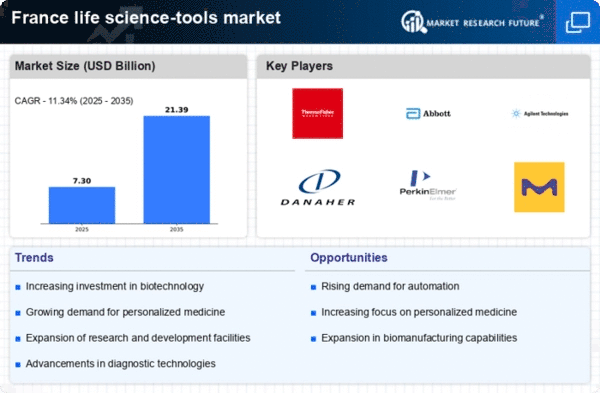Expansion of Research Institutions
The life science-tools market in France is significantly influenced by the expansion of research institutions and academic collaborations. In recent years, numerous research centers have been established, focusing on various aspects of life sciences, including genomics, proteomics, and drug discovery. This proliferation of institutions is expected to create a robust demand for life science tools, as researchers require advanced equipment and technologies to conduct their studies. In 2025, it is estimated that the number of research publications in life sciences will increase by 15%, indicating a growing interest in this field. Consequently, the life science-tools market is likely to benefit from the heightened research activities, as institutions seek to acquire cutting-edge tools to support their scientific endeavors.
Rising Investment in Biotechnology
The life science-tools market is experiencing a notable surge in investment, particularly within the biotechnology sector. This increase is driven by both public and private funding initiatives aimed at fostering innovation and research. In 2025, the French government allocated approximately €1.5 billion to support biotechnology research, which is expected to enhance the capabilities of life science-tools. This influx of capital is likely to stimulate the development of advanced tools and technologies, thereby expanding the market. Furthermore, the growing number of biotech startups in France indicates a robust entrepreneurial ecosystem, which may further propel the life science-tools market forward. As these companies emerge, they often require sophisticated tools for research and development, creating additional demand within the industry.
Growing Demand for Diagnostic Tools
The life science-tools market in France is witnessing an increasing demand for diagnostic tools, driven by the need for early disease detection and personalized treatment options. The French healthcare system is placing greater emphasis on precision medicine, which necessitates the use of advanced diagnostic technologies. In 2025, the market for diagnostic tools is projected to grow by approximately 8%, reflecting the rising awareness among healthcare providers and patients regarding the importance of accurate diagnostics. This trend is likely to encourage manufacturers to innovate and enhance their product offerings, thereby contributing to the overall growth of the life science-tools market. Additionally, the integration of artificial intelligence in diagnostic tools may further revolutionize the industry, providing more efficient and reliable solutions.
Advancements in Automation and Robotics
The life science-tools market in France is benefiting from advancements in automation and robotics, which are transforming laboratory processes and research methodologies. The integration of automated systems is enhancing efficiency, reducing human error, and allowing for high-throughput screening in various applications. In 2025, the market for automated life science tools is projected to grow by 12%, driven by the increasing need for precision and speed in research. This trend is likely to encourage laboratories to adopt robotic solutions, thereby streamlining workflows and improving productivity. As automation becomes more prevalent, the life science-tools market may witness a shift in the types of products in demand, with a greater emphasis on integrated systems that combine multiple functionalities.
Increased Focus on Environmental Sustainability
The life science-tools market in France is increasingly aligning with the global trend towards environmental sustainability. As researchers and companies become more aware of the environmental impact of their operations, there is a growing demand for eco-friendly tools and technologies. This shift is prompting manufacturers to innovate and develop sustainable solutions that minimize waste and energy consumption. In 2025, it is anticipated that the market for sustainable life science tools will grow by 10%, reflecting the industry's commitment to reducing its carbon footprint. This focus on sustainability not only enhances the reputation of companies within the life science-tools market but also attracts environmentally conscious investors and consumers, potentially leading to increased market share.
















